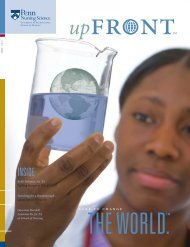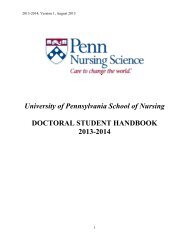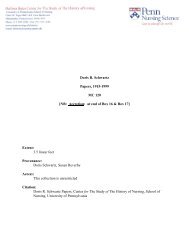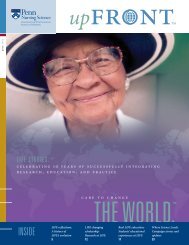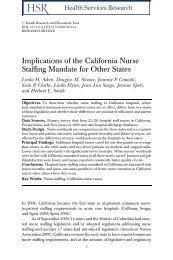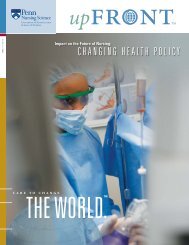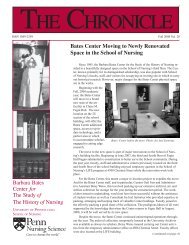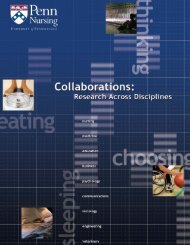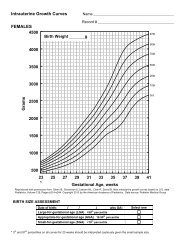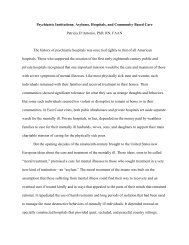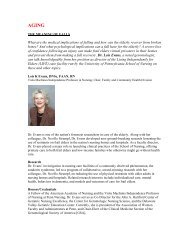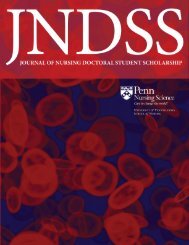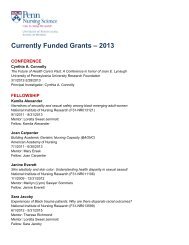Research Centers - University of Pennsylvania School of Nursing
Research Centers - University of Pennsylvania School of Nursing
Research Centers - University of Pennsylvania School of Nursing
Create successful ePaper yourself
Turn your PDF publications into a flip-book with our unique Google optimized e-Paper software.
enough nursing staff on the job to provide<br />
high-quality care, compared to 65 percent in<br />
Canada, 71 percent in England, 62 percent<br />
in Scotland, 63 percent in Germany, and<br />
56 percent in New Zealand. “Poor nurse<br />
retention and preventable patient deaths<br />
are common in hospitals all over the world,”<br />
said Dr. Aiken.<br />
“We must show stakeholders<br />
— hospitals and health systems whose<br />
capacity to continue to grow will be limited<br />
by nurse shortage, large employers who<br />
purchase healthcare for their employees,<br />
the health insurance industry, local business<br />
interests and local and state governments<br />
that benefit from job creation and revenue<br />
generated from healthcare, and patients and<br />
their advocates — that staying where we<br />
are is not an option, and that doing nothing<br />
will result in a worse alternative. We must<br />
use research, policy analysis, evaluations <strong>of</strong><br />
best practices, and the media to convince<br />
stakeholders to collaborate on an action<br />
plan,” said Dr. Aiken.<br />
“The number <strong>of</strong> international nurses<br />
in the U.S. has tripled since 1994,” said Dr.<br />
Aiken. “The loss <strong>of</strong> nurses through migration<br />
from sub-Saharan Africa is one <strong>of</strong> the major<br />
barriers to addressing the HIV-AIDS crisis.”<br />
While one in five adults in South Africa is<br />
HIV positive, first-world countries continue<br />
to recruit South African nurses. “Nurses<br />
are leaving because conditions make it<br />
impossible to be nurses there,” said Dr. Aiken.<br />
“We are currently designing a public-private<br />
partnership to develop magnet hospitals to<br />
retain nurses in developing countries,” while<br />
also developing policy to expand U.S. nurse<br />
supply with domestic applicants and retain<br />
more nurses in clinical care.<br />
The data compiled by Dr. Aiken and<br />
her colleagues have impacted healthcare<br />
policy on many fronts, including state- and<br />
federal level legislation related to safe<br />
staffing levels in hospitals. Their pioneering<br />
paper on nurse education and surgical<br />
patient outcomes in the Journal <strong>of</strong> the<br />
American Medical Association was used<br />
to support a reaffirmation <strong>of</strong> the BSN job<br />
requirement for permanent positions in<br />
the federal health services, the adoption<br />
by the American Organization <strong>of</strong> Nurse<br />
Executives <strong>of</strong> a resolution in support <strong>of</strong> the<br />
BSN as a desired qualification <strong>of</strong> hospital<br />
nurses, pending state legislation on the<br />
bachelor’s degree as a condition <strong>of</strong> ongoing<br />
licensure. Dr. Aiken’s research on Magnet<br />
hospitals has laid the ground for the Magnet<br />
Recognition program’s ongoing success and<br />
countless other initiatives that focus on<br />
transforming nurses’ work environment.<br />
“Our research has given the field<br />
new methods and measures for studying<br />
nursing outcomes. Our leadership has<br />
created a cadre <strong>of</strong> nurse outcomes<br />
researchers in U.S. and abroad whose work<br />
challenges the status quo. And our research<br />
has been disseminated to those who can<br />
and are making changes to improve hospital<br />
quality and the adequacy <strong>of</strong> global nurse<br />
workforce,” said Dr. Aiken.<br />
38 |




